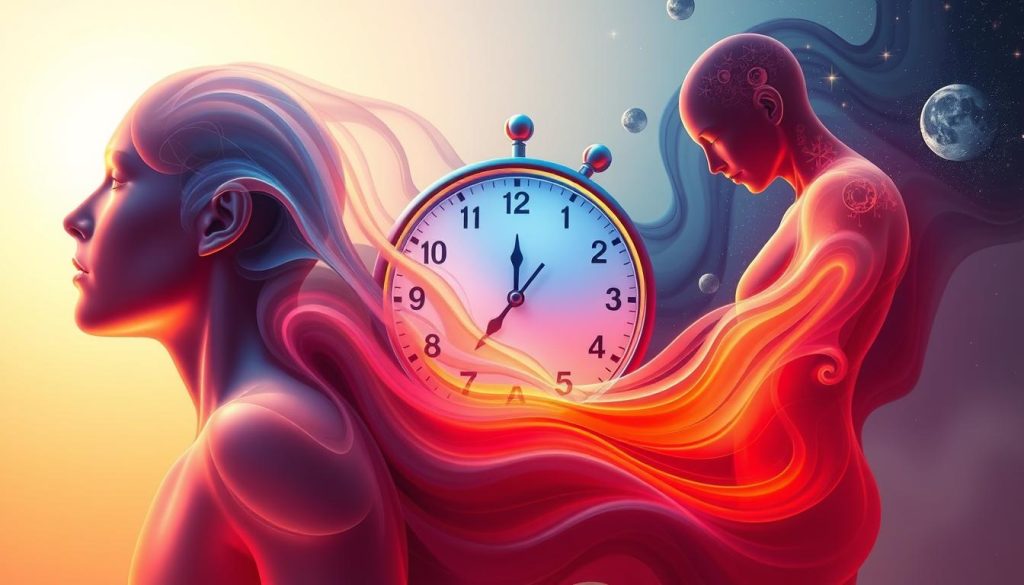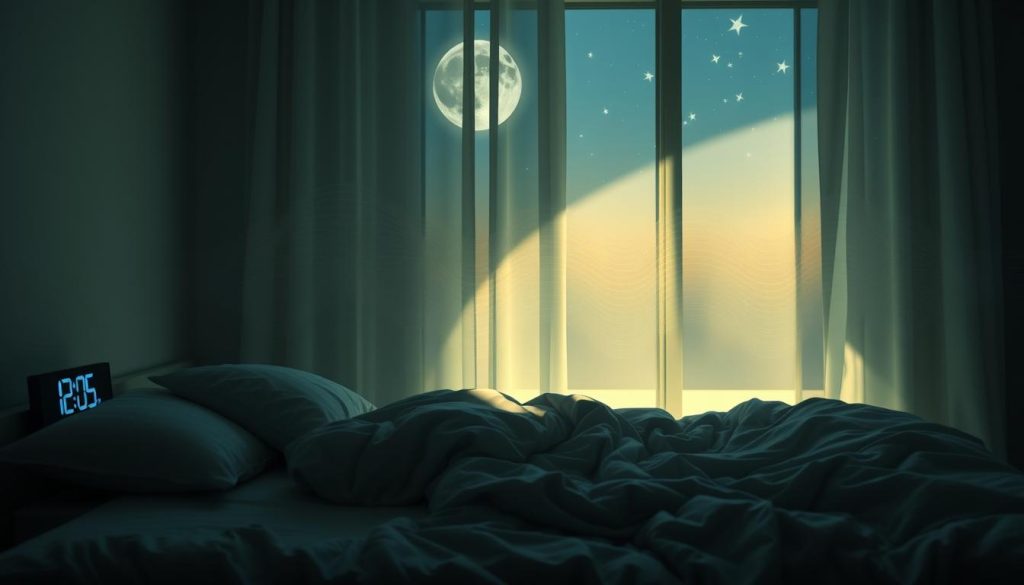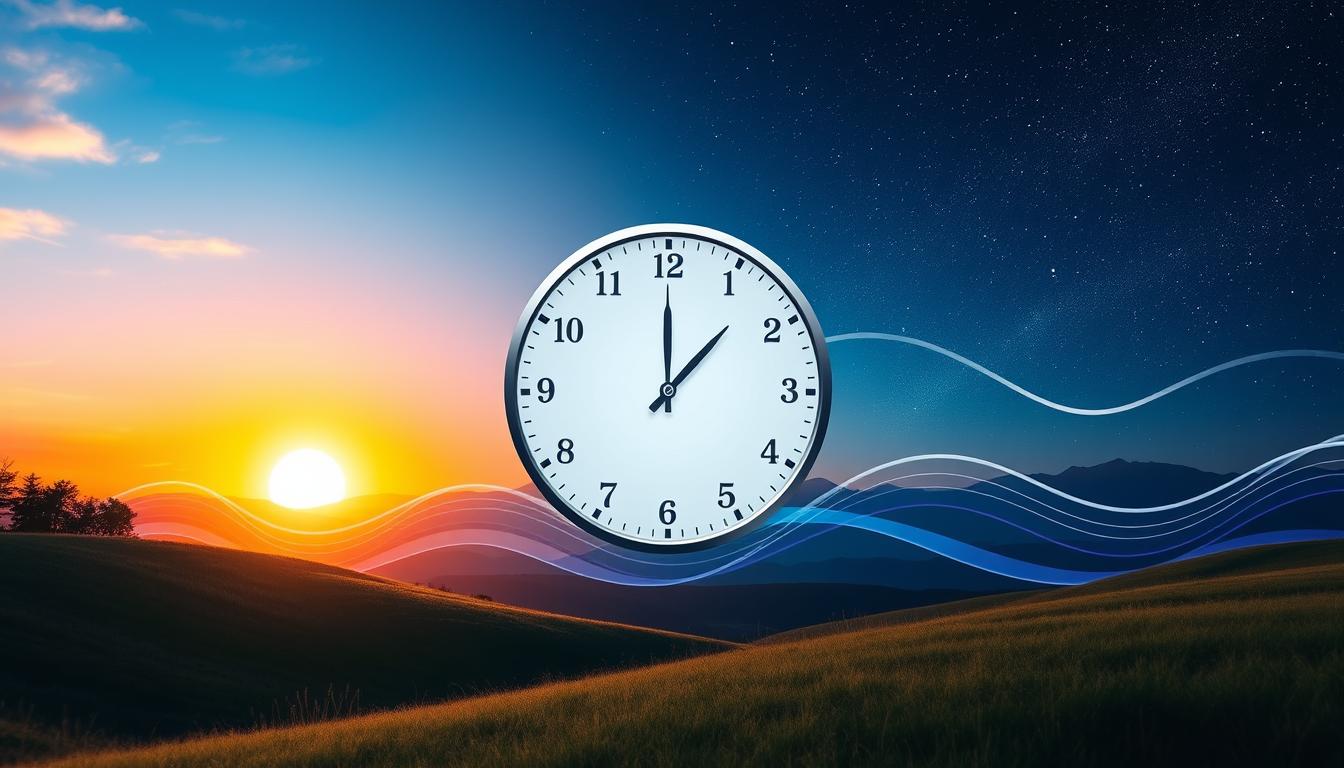Ever thought about how our bodies work so well all day? It’s all thanks to our circadian rhythm, an internal clock that controls sleep, wake times, and body temperature. Knowing this is key because it affects how we live, from work to health. By learning how body temperature changes with our internal clock, we can improve our daily life.
What is the Circadian Rhythm?
The idea of circadian rhythms is really interesting. It shows how our bodies are connected to the world around us. Knowing about circadian rhythms helps me see how my body’s internal clock works. It controls not just when we sleep and wake up, but also other body functions all day long.
Defining Circadian Rhythms
Circadian rhythms are the physical, mental, and behavioral changes that happen every 24 hours. They are influenced by things like light and temperature. Keeping a regular schedule helps me stay healthy and productive.
The Science Behind Circadian Rhythms
The science of circadian rhythms is complex. It shows how our bodies and the environment work together. For example, light in the morning helps us feel awake by releasing a hormone called cortisol. In the evening, our bodies start to get ready for sleep by making melatonin.
How My Circadian Rhythm Shapes My Daily Life
Living in sync with my circadian rhythm changes my day a lot. Staying true to my body’s natural rhythm makes me feel more energetic and happy. For instance, waking up early helps me be more productive. But, if my schedule is all over the place, I feel tired and unmotivated.
| Time of Day | Biological Function | Impact on Daily Life |
|---|---|---|
| 6 AM – 9 AM | Waking Up, Increased Cortisol Levels | Enhanced alertness, optimal for planning |
| 12 PM – 2 PM | Peak Productivity | Increased focus, ideal for complex tasks |
| 9 PM – 11 PM | Preparation for Sleep, Melatonin Release | Wind down, reduced energy levels |
How Body Temperature Fluctuates Throughout the Day
My body temperature changes naturally throughout the day, following my circadian rhythm. Knowing these patterns helps me stay healthy. In the morning, my temperature goes up right after I wake up. It then drops as the day goes on.
This rise and fall is key to my health and how I feel.
Daily Patterns of Body Temperature
Every day, my body temperature goes through a cycle. It has different stages:
- Morning Rise: My temperature starts to go up, usually peaking between 10 a.m. and noon.
- Afternoon Stability: After noon, my temperature stays the same, keeping my energy steady.
- Evening Decline: As night gets closer, my temperature goes down, telling me it’s time to rest.
These patterns are not just interesting. They help me stay alert and full of energy all day.
Factors Influencing My Body Temperature
Many things can change how my body temperature goes up and down. Some important ones are:
- Physical Activity: Working out makes my body temperature go up. It stays higher even after I stop exercising.
- Diet: What I eat affects my metabolism and body temperature. For example, spicy foods can make it go up briefly.
- Emotional Stress: Feeling stressed can make my body temperature rise. This is because of hormonal changes and a faster heart rate.
Knowing what affects my body temperature helps me keep it balanced. This improves my physical and mental health.

Circadian Rhythm and Body Temperature: The Interconnection
Looking into how circadian rhythm and body temperature work together is really interesting. It shows how our body systems work together all day. This understanding helps us see how our health and daily activities are connected.
How My Circadian Rhythm Affects My Body Temp
My body temperature changes throughout the day, following my circadian rhythm. In the daytime, it peaks when I’m most active, usually in the late afternoon. This helps me perform better and stay alert.
As night comes, my temperature drops, telling me it’s time to sleep. This natural change shows how important it is for my health and wellbeing.
The Role of Light and Darkness
Light exposure is key in setting my circadian rhythm. Morning light keeps me awake and my temperature up. When it gets dark, my body temperature goes down, and I feel sleepy.
This light-dark cycle affects my energy, hunger, and when I want to exercise. It’s all about how my body responds to light and dark.
Understanding Temperature Peaks in My Day
I’ve noticed my body temperature peaks at the same times every day. These peaks happen in the morning and late afternoon, when I’m most active. Knowing this helps me plan my day better.
Here’s a table showing when these temperature peaks happen and what I’m usually doing:
| Time of Day | Typical Body Temperature | Associated Activity |
|---|---|---|
| Morning (8 AM – 10 AM) | 98.6°F | Waking Up, Breakfast |
| Afternoon (2 PM – 4 PM) | 99.1°F | Work, Exercise |
| Evening (8 PM – 10 PM) | 97.8°F | Relaxing, Preparing for Sleep |

The Impact of My Circadian Rhythm on Sleep
The connection between my circadian rhythm and sleep is really interesting. It affects how well I sleep at night. Knowing this helps me understand why I feel cooler during the night. It shows how my body naturally supports good sleep.
Sleep Stages and Body Temperature
My body temperature changes as I go through different sleep stages. When I’m in light sleep, my body temperature stays at a good level. But when I get into deeper sleep, it drops a bit.
This drop in temperature is important. It tells my body it’s time to rest and heal.
Why I Experience Nighttime Coolness
Feeling cooler at night is linked to my circadian rhythm and sleep. As night comes, my body gets ready for sleep by cooling down. This is in line with research that says a slight cool-down improves sleep quality.
Accepting this cool state helps me sleep deeper. It leads to better recovery and feeling refreshed in the morning.

Tips for Harmonizing My Circadian Rhythm and Body Temperature
To improve my health, I’ve learned a few key tips. One is to stick to a regular sleep schedule. Going to bed and waking up at the same time every day helps my body know when to rest and when to be awake. This helps keep my internal clock in sync.
Another important thing is to make my sleep space just right. Keeping my bedroom cool (around 60 to 67 degrees Fahrenheit) helps me sleep better. It also matches my body’s natural temperature drop at night, leading to deeper sleep. Plus, I keep it dark and quiet to improve my sleep quality.
Finally, I watch how much light I get during the day. In the morning, I try to get lots of natural light to tell my body it’s time to be active. At night, I avoid screens with blue light to help my body make melatonin. These simple steps help me feel more alert and focused during the day.

